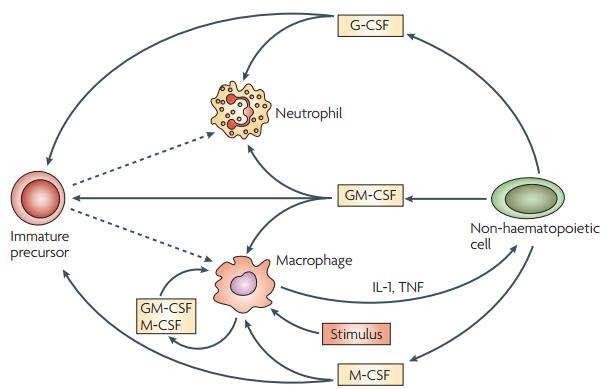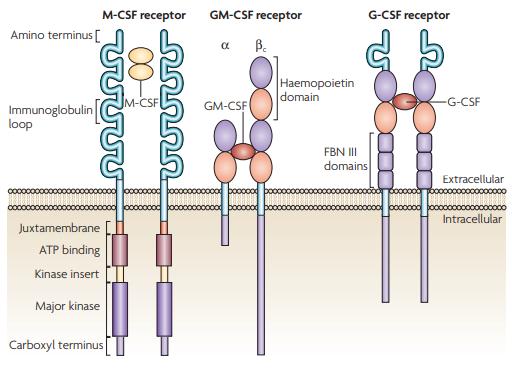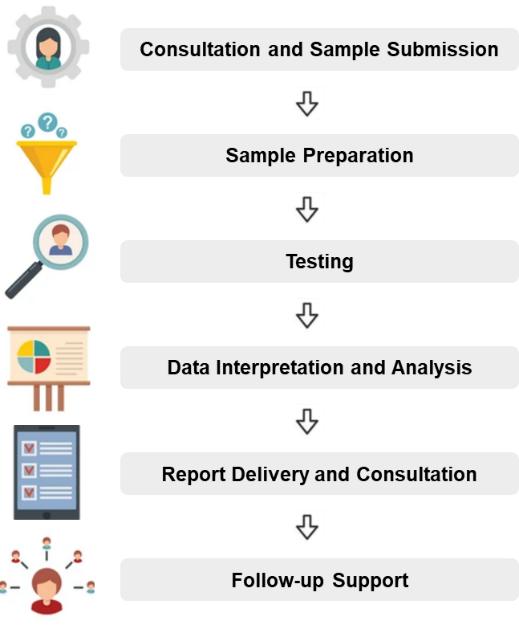Introduction to Colony Stimulating Factor (CSF)
Colony Stimulating Factors (CSFs) represent a class of glycoproteins exogenously secreted by specific cell types within the body, instrumental in the proliferation and differentiation of hematopoietic cells, notably leukocytes. These biomolecular entities play a pivotal role in maintaining optimal immune system functionality. They orchestrate leukopoiesis by stimulating the generation of crucial leukocytes, indispensable for combating and neutralizing pathogenic invasions.
 Fig 1. Proposed pro‑inflammatory 'CSF network'. (Hamilton, J. A. 2008)
Fig 1. Proposed pro‑inflammatory 'CSF network'. (Hamilton, J. A. 2008)
Classification of CSF
CSFs are categorized into several types such as Granulocyte Colony-Stimulating Factor (G-CSF), Granulocyte-Macrophage Colony-Stimulating Factor (GM-CSF), and Macrophage Colony-Stimulating Factor (M-CSF), all of which exert influence on specific varieties of leukocytes. Originally, GM-CSF, M-CSF, and G-CSF were classified based on their capacities to orchestrate in vitro development of mature myeloid colonies from progenitor cells in the bone marrow. Specifically, this development follows cell proliferation and differentiation into granulocytic and macrophage colonies in the context of GM-CSF, macrophage colonies directed by M-CSF, and granulocytic colonies elicited by G-CSF.
Subsequent research revealed these CSFs possess additional capacities to act in vitro on mature myeloid cells, suggesting their roles in the immune response extend beyond functioning solely as hematopoietic-cell growth factors.
 Fig 2. The structures of CSF receptors. (Hamilton, J. A. 2008)
Fig 2. The structures of CSF receptors. (Hamilton, J. A. 2008)
Application of CSF
In clinical medicine, CSFs are effectively employed as bio-stimulants to provoke the bone marrow to proliferate a higher quantity of leukocytes. This application is particularly prevalent in patients experiencing compromised immune systems, as seen in those undergoing chemotherapeutic treatments or those suffering from particular chronic infections or diseases. The application of CSFs as a therapeutic intervention has been synthesized in the form of pharmaceutics, primarily administered via injections.
Concomitantly, CSFs, whilst advantageous in boosting immune response, are associated with certain adverse effects. Common symptoms include bone discomfort, lethargy, pyrexia, and in rare instances, consequential pulmonary complications.
Recently, there has been burgeoning interest in the application of CSFs within the realm of stem cell research. By harnessing their capacity to accentuate the proliferation and differentiation of stem cells within a rigorously controlled laboratory environment, CSFs hold the potential to significantly contribute to the advancement of novel therapeutic strategies for a multitude of diseases.
Future perspectives
The correlation between inflammation and pathological conditions such as cancer, atherosclerosis, and obesity is increasingly recognized in the current scientific landscape. This emerging comprehension highlights the potential relevancy of CSFs in a multitude of human diseases and conditions. It is noteworthy that certain cell types, for instance, macrophages, can contribute to tissue damage as well as repair during an inflammatory response. In this context, the function of cytokines, such as CSFs, is multifaceted and is dictated by the specific nature and developmental phase of the inflammatory response.
What Can We Offer?
Service Process

Acknowledged as an innovator within the sphere of biotechnology, Creative Proteomics showcases an extensive portfolio of services that delve into the intricate domain of protein pharmaceutical characterization. As a scholar or a professional seeking exhaustive insights or contemplating a deep dive into the plethora of capabilities we proffer, your queries and communication are always welcome. Please feel free to connect with us for further discussion or to seek additional information.
Reference
- Hamilton, J. A. Colony-stimulating factors in inflammation and autoimmunity. Nature Reviews Immunology. 2008, 8(7), 533–544.
Related Sections
Services
Applications
Creative Proteomics specializes in protein drug characterization, and we offer a range of services to help our clients understand and optimize their protein drug products. Our services include, but are not limited to:
|
Protein Drug characterization
|
Reaearch Project
|
Method
|
Application
|
|
Protein Structure Confirmation Service
|
Primary Structure Analysis
|
X-ray crystal diffraction,
nuclear magnetic resonance (NMR) spectroscopy,
ellman's assay,
ion exchange chromatography (IEC),
edman degradation,
mass spectrometry (MS), etc.
|
Protein functions, disease mechanisms, and drug design, etc.
|
|
Higher-Order Structure Analysis
|
|
Post-Translational Modification (PTM) Analysis Service
|
Protein Glycan Analysis
|
Mass spectrometry (MS),
nuclear magnetic resonance (NMR) spectroscopy,
lectin affinity chromatography,
liquid chromatography-mass spectrometry (LC-MS), etc.
|
Disease mechanism research, drug discovery and development, regulation of biological processes, clinical diagnostic, bioinformatics, etc.
|
|
Protein Acetylation Analysis
|
|
Protein Phosphorylation Analysis
|
|
Protein Ubiquitination Analysis
|
|
Protein Deamidation Analysis
|
|
Protein Oxidation Analysis
|
|
Protein Methylation Analysis
|
|
Protein Alkylation Analysis
|
|
Protein Sulfation Analysis
|
|
Proteolysis Analysis
|
|
Protein Truncation Analysis
|
|
Protein Physicochemical Property Determination Service
|
Isoelectric Point (PI) Determination
|
Isoelectric focusing (IEF),
thioflavin T (ThT) fluorescence assay,
western blotting,
ultraviolet-visible spectrometry,
fluorescence spectrometry, etc.
|
Protein structure study, protein interaction study, protein modification study, protein purity and quantitative analysis, clinical diagnosis, etc.
|
|
Charge Variant Analysis
|
|
Extinction Coefficient Determination
|
|
Protein Aggregation Analysis
|
|
Protein Degradation Analysis
|
|
Thermal (Tm) Stability Analysis
|
|
Protein Quantitation
|
|
Protein Purity Service
|
/
|
Composition-based and activity-based analyses,
mass spectrometry (MS),
high performance liquid chromatography,
capillary electrophoresis, etc.
|
Biomedical research, biological research, clinical diagnostics, etc.
|
|
Protein Impurities Service
|
Host Cell Protein (HCP) Analysis
|
High performance liquid chromatography (HPLC),
mass spectrometry (MS),
size-exclusion chromatography (SEC),
capillary electrophoresis, etc.
|
Quality control, safety assessment, clinical diagnostics, bioprocess research, etc.
|
|
Residual Host Cell DNA (HCD) Analysis
|
|
Residual Protein A Analysis
|
|
Process Related Impurities and Residual Analysis
|
|
Protein Biosafety Analysis Service
|
Bacterial Endotoxins Testing
|
Limulus amebocyte lysate (LAL),
membrane filtration,
PCR,
nucleic acid testing (NAT),
massively parallel sequencing (MPS), etc.
|
Biomedical research, food safety testing, environmental science, industrial production, etc.
|
| Bioburden Testing |
| Sterility Testing |
| Abnormal Toxicity Testing |
| Mycoplasma Testing |
| Subvisible Particles Analysis |
| Visible Particles Analysis |
For research use only, not intended for any clinical use.


 Fig 1. Proposed pro‑inflammatory 'CSF network'. (Hamilton, J. A. 2008)
Fig 1. Proposed pro‑inflammatory 'CSF network'. (Hamilton, J. A. 2008) Fig 2. The structures of CSF receptors. (Hamilton, J. A. 2008)
Fig 2. The structures of CSF receptors. (Hamilton, J. A. 2008)
